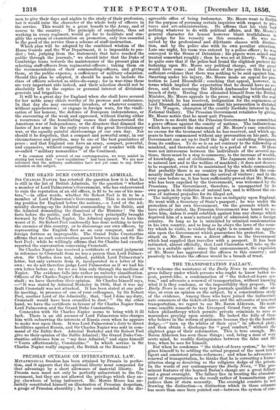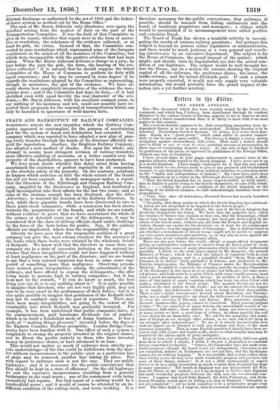THE TRANSPORTATION FALLACY.
WE welcome the assistance of the Daily News in correcting the gross fallacy under which persons who ought to know better re- peat, parrot-like, a condemnation of " the ticket-of-leave sys- tem," and advocate a renewal of transportation, without knowing what it is they condemn, or the impossibility they propose. The Daily News is one of the very few journals qualified to offer ad- vice, or even an opinion on the subject, by a conscientious study of the evidence. Among those who have joined the indiscrimi- nate censurers of the ticket-of-leave and the advocates of renewed transportation, we regret to see Mr. Baron Alderson. He made some sensible remarks to the Liverpool Grand Jury on the mis- taken philanthropy which permits private criminals to rove as marauders preying upon society. He lashed the folly of those who believe in the reform of prisoners because they do the humble dodge —" turn up the whites of their eyes" in affected piety, and then obtain a discharge for " good conduct," without the slightest gage of their reformation. This is true enough. Mr. Baron Alderson has seen these things ; and, being a man of very acute mind, he readily distinguishes between the false and the true, when he sees for himself. But when he condemns " the ticket-of-leave system," he ima- gines himself to be settling the actual proposal of- the most intel- ligent and consistent prison-reformers ; and when he advocates a renewal of transportation, he thinks that he is correcting a huma- nitarian slang as deceiving as the religious dodge of the prison. In the words of our contemporary the Daily News, " The _pro- minent features of the learned Baron's charge are a great fallacy and a great oversight. The fallacy lies in treating the abandon- ment of transportation as the result rather of humanitarian pre- judices than of stern necessity. The oversight consists in not drawing the distinction—a distinction which in these columns has more than once been pointed out—between the system of con-
ditional discharge as authorized by the act of 1853 and the ticket- of-leave system as worked out by the Home Office."
The case of Mr. Baron Alderson only illustrates over again the mischief arising from the neglect of duty on the part of the Transportation Committee. It was the duty of that Committee to give in its report, whether that report were in the form of narra- tive or resolution, the substance of the evidence collected, or at least its pith, its virtue. Instead of that, the Committee con- sented to pass resolutions which represented some of the foregone conclusions in the minds of all the members of the Committee, but which were incompatible with the positive evidence that had been taken. When Mr. Baron Alderson delivers a charge to a jury, he lays before the jury the pith, the force, the bearing of the evi- dence collected : it is natural that he should suppose the Select Committee of the House of Commons to perform its duty with equal conscience ; and he may be excused in some degree if he regards the resolutions adopted by the Committee as representing, though in miniature, the gist of the evidence. We have ready shown how completely irrespective of the evidence the reso- lutions were ; and if the Committee had done its duty,—if it had sketched even with equal brevity the real character of the evi- dence,—Mr. Baron Alderson, with his excellent common sense, to say nothing of his keenness and wit, could not possibly have re- peated those proposals for the renewal of transportation which can only be hazarded in ignorance of well-known facts.

































 Previous page
Previous page